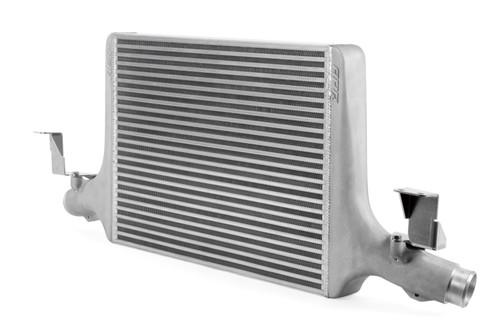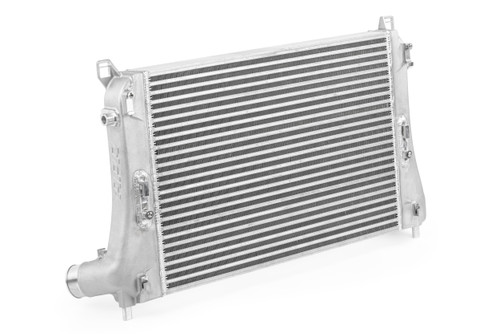*Fits MK7 Golf 1.8T, GTI, R, Audi (8v) A3 / S3, Audi (8S) TT/TTS, VW Arteon 2.0T, MK7 Jetta GLI, VW (B8) Passat, MK2 Tiguan
Features:
- Dramatically lowers intake air temp (IAT)
- -- Increases horsepower while minimizing power-robbing heat soak!
- -- Effectiveness tested to over 500 HP!
- -- 21 horsepower gain over the factory system!
- Massive core size
- -- Use of the OEM-location allows for a massive intercooler core.
- -- 24.25" x 16.25" x 1.16" - 457.1 in³ - OEM MK7 Golf/Tiguan
- -- 24.25" x 16.25" x 1.25" - 492.5 in³ - OEM MK7 GTI
- -- 24.25" x 16.25" x 1.37" - 529.8 in³ - OEM MK7 Golf R
- -- 24.00" x 16.25" x 2.25" - 877.5 in³ - APR
- Intercooler installed in the best location for this platform
- - Utilizes factory air dams for exceptional airflow across the core.
- - 100% compatible with the Adaptive Cruise Control (ACC) system.
- Highly effective core design
- -- Bar-and-plate core with staggered and louvered fins.
- -- Rigorous testing determined core style, fin density, and size.
- -- Low pressure drop + highly effective cooling = high performance!
- Smooth cast end tanks
- -- Engineered for low turbulence/restriction and maximum flow.
- -- Organically shaped to promote airflow across entire core.
- -- Pressure tested to prevent power robbing boost leaks.
- -- No hidden labor costs or permanent modifications
- No trimming, cutting, or other costly modification required.
- -- No modification to the Adaptive Cruise Control System required.
- -- Full directions and APR world-renowned customer support included.
- Designed by engineers with lasers
- -- With the best equipment and smartest engineers, it just works!





















